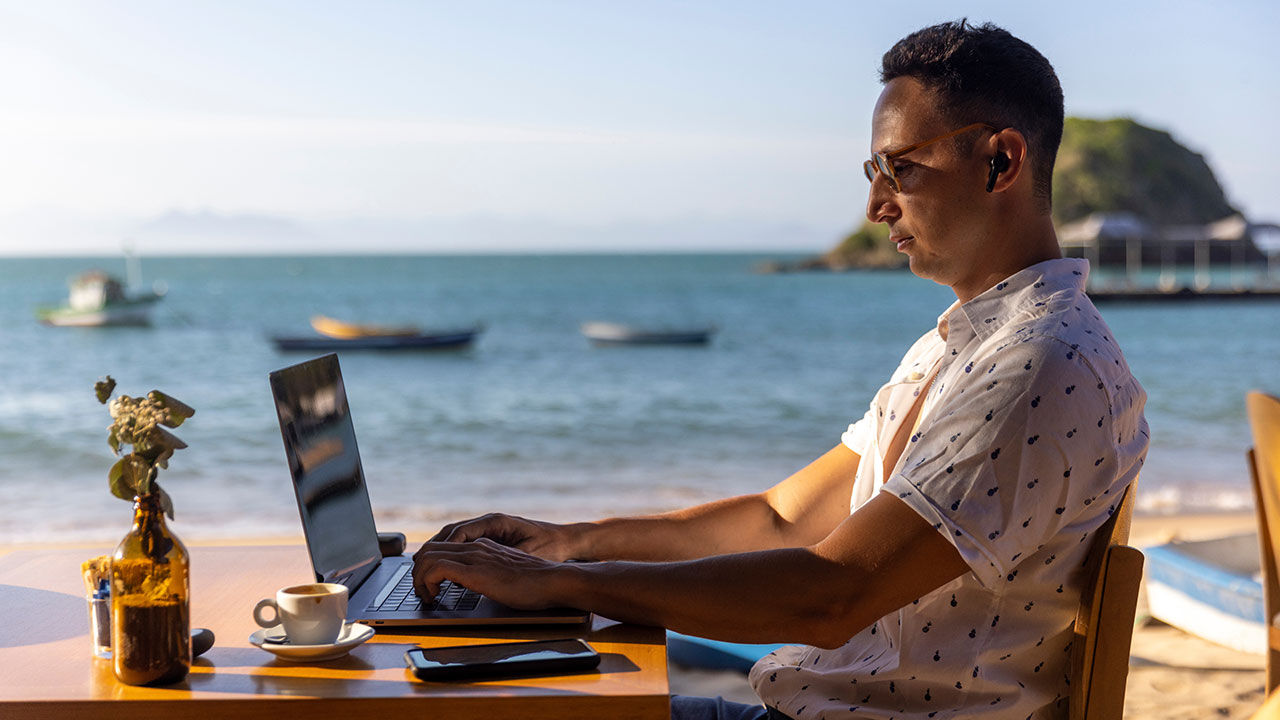The allure of the digital nomad lifestyle has captivated the imagination of many. The thought of trading a cubicle for a beachfront cafe in Bali or a co-working space in Lisbon is incredibly appealing.
This lifestyle, characterized by remote work and perpetual travel, offers a unique blend of professional and personal freedom that a traditional 9-to-5 job simply can’t match.
But what exactly is a digital nomad, and how can you make this dream a reality?
This comprehensive guide will delve deep into the world of digital nomads, covering everything from the foundational mindset and essential skills to practical tips for managing finances, choosing destinations, and maintaining a healthy work-life balance.
Whether you’re a seasoned professional looking to transition or a fresh graduate exploring alternative career paths, this article is your roadmap to a life of adventure and autonomy.
What is a Digital Nomad?

A digital nomad is an individual who uses telecommunications technologies to earn a living and, more broadly, to perform their work.
They are not tied to a single location and can work from anywhere in the world as long as they have a reliable internet connection.
The term “digital nomad” encompasses a wide range of professions, from freelance writers and graphic designers to software developers and online marketers.
The core principle is location independence. This freedom allows them to travel continuously, living in different countries and experiencing diverse cultures without interrupting their professional responsibilities.
The rise of this lifestyle is a direct result of advancements in technology, particularly high-speed internet, cloud computing, and a growing acceptance of remote work by companies and clients.
The Allure and Reality of the Digital Nomad Life
The romanticized image of a digital nomad often involves working a few hours a day on a laptop with a stunning view, spending the rest of the time exploring.
While this can be a part of the experience, the reality is more nuanced. It requires a significant amount of self-discipline, financial planning, and adaptability.
A. Freedom and Flexibility
The most obvious benefit is the freedom to design your life on your own terms. You can choose where you live, what hours you work, and what projects you take on. This flexibility allows for a better work-life integration, not just balance, where work and life are seamlessly woven together.
B. Cultural Immersion
Living in different countries provides an unparalleled opportunity for cultural immersion. You learn new languages, try local cuisines, and gain a deeper understanding of the world. This enriches your personal growth and broadens your perspective.
C. Cost of Living Arbitrage
By earning in a higher-income currency (e.g., USD, EUR) and living in a country with a lower cost of living (e.g., Southeast Asia, parts of Eastern Europe), digital nomads can significantly increase their disposable income and save money.
D. The Challenges
However, the lifestyle is not without its challenges. Loneliness can be a significant issue, as you are often far from your established social circles. Finding reliable internet, dealing with visa complexities, and managing time zones are also constant hurdles. The line between work and leisure can blur, leading to burnout if not managed properly.
Essential Skills and Professions for Digital Nomads
Not all jobs are suitable for the digital nomad lifestyle. The most successful nomads are in professions that are easily portable and in high demand.
A. Web Development and Programming
With the global demand for software solutions, web developers, data scientists, and programmers can work for clients anywhere in the world. Their skills are highly valued, and projects can be managed entirely online.
B. Content Creation and Marketing
This category includes writers, bloggers, videographers, and social media managers. Companies are always looking for compelling content to attract customers, and these roles can be performed remotely.
C. Graphic Design and UX/UI Design
Visual communication is a key component of modern business. Graphic designers and UX/UI specialists can collaborate with clients through online platforms, making their profession an excellent fit for a nomadic lifestyle.
D. Online Consulting and Coaching
Experts in various fields, from business strategy to fitness, can offer their services remotely. Online platforms and video conferencing tools have made it easy to connect with clients across the globe.
E. E-commerce and Dropshipping
Running an online store allows you to manage a business from anywhere. With a dropshipping model, you don’t even need to handle inventory, further enhancing your location independence.
The Financial Blueprint: How to Fund Your Travels
Financial stability is the cornerstone of a successful digital nomad life. Without a steady income, the dream can quickly turn into a nightmare.
A. Passive Income Streams
Building passive income, such as through affiliate marketing, creating online courses, or investing in stocks, can provide a safety net and allow for more freedom.
B. Freelancing Platforms
Websites like Upwork, Fiverr, and Toptal are excellent starting points. They connect you with clients globally and allow you to build a portfolio and reputation.
C. Securing Remote Jobs
Many companies now offer fully remote positions. Websites like We Work Remotely, Remote.co, and FlexJobs specialize in listing these opportunities. A stable remote job can provide the security of a regular paycheck while you travel.
D. Budgeting and Saving
Before you start, it’s crucial to have a solid savings fund to cover initial expenses and emergencies. Create a detailed budget for each destination, including accommodation, food, transportation, and leisure activities. Tools like Nomad List can help you estimate living costs in different cities.
Choosing Your First Destination: A Strategic Approach
The world is your oyster, but some places are more “nomad-friendly” than others. Your choice of destination should be based on several factors.
A. Internet Connectivity
This is non-negotiable. Research the average internet speeds and reliability in a potential city. Co-working spaces and cafes with strong Wi-Fi are essential.
B. Cost of Living
Compare the cost of living with your projected income. Popular destinations like Chiang Mai, Lisbon, and Medellin are known for being affordable without sacrificing quality of life.
C. Visa and Immigration Laws
Understand the visa requirements for your passport. Many countries offer specific digital nomad visas or long-term tourist visas that make staying for extended periods legal and straightforward.
D. Safety and Infrastructure
Research the safety of the city and the quality of its infrastructure, including healthcare and transportation. It’s important to feel secure and have access to essential services.
E. Community
Look for cities with a vibrant digital nomad community. This can help you combat loneliness, network with other professionals, and find support.
The Practicalities of Life on the Road
Managing the logistics of a nomadic life requires organization and smart tools.
A. Accommodation
Platforms like Airbnb, Booking.com, and local rental sites are essential for finding short-term and long-term housing. Some digital nomads prefer staying in co-living spaces designed for remote workers.
B. Banking and Finances
Consider a bank with no international fees, such as Wise (formerly TransferWise) or Revolut. This will save you a significant amount on transaction fees. Having multiple cards from different banks is also a good backup plan.
C. Health Insurance
Travel insurance is a must. Companies like SafetyWing and World Nomads offer plans specifically designed for digital nomads, covering medical emergencies and travel-related issues.
D. Time Management
With no fixed schedule, you need to be disciplined. Use project management tools like Trello or Asana, and time-tracking apps like Toggl to stay on top of your work and client deadlines.
The Mindset: Embracing the Digital Nomad Lifestyle
Finally, the most important aspect is your mindset. A successful digital nomad is not just a person who works remotely; they are a perpetual learner, a problem-solver, and a resilient individual.
A. Embrace Change
The nomadic life is full of unpredictability. You must be prepared to handle last-minute changes, unexpected delays, and cultural misunderstandings with a positive and flexible attitude.
B. Continuous Learning
The world of remote work and technology is constantly evolving. To stay competitive, you must commit to continuous learning, whether it’s a new skill, a new language, or just staying updated on industry trends.
C. Self-Discipline
Without a boss or colleagues physically present, you are your own accountability partner. You need to create your own structure and discipline to ensure you meet your professional goals.
Conclusion
The digital nomad lifestyle is more than just a trend; it’s a profound shift in how we approach work and life. It offers the unparalleled opportunity to pursue your passions, explore the world, and build a career on your own terms.
While it demands a certain level of discipline and financial prudence, the rewards—freedom, adventure, and personal growth—are immeasurable.
If you’re ready to break free from the traditional confines of a desk job and explore the world, the digital nomad life might just be the perfect journey for you.










